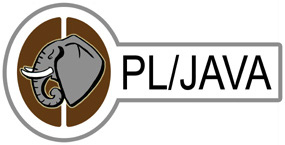
PL/Java is a free open-source extension for PostgreSQL™ that allows stored procedures, triggers, and functions to be written in the Java™ language and executed in the backend. More about the features and benefits of PL/Java can be read on the wiki.
This site includes reference information on PL/Java, covering how to build it, install it, and use it. There is also a wiki with more information and examples, though in some cases dated. While information from the wiki is gradually being migrated to this site and brought up to date, you should still check the wiki for information you do not find here.
The following sections offer very brief summaries.
Backend functions and triggers are written in Java using a directly-connected, efficient version of the standard Java JDBC API that PL/Java transparently provides, with enhanced capabilities found in the PL/Java API.
PL/Java source files can use Java annotations from the org.postgresql.pljava.annotation package to identify the methods and types that should be seen in PostgreSQL, as in this example code. For a step-by-step example, there is always Hello, world.
When the sources are compiled, the Java compiler will also write an SQLJ deployment descriptor containing the SQL statments that must be executed when installing and uninstalling the compiled Java code in the PostgreSQL backend.
When the compiled Java code and the deployment descriptor file are stored together in a JAR file, PL/Java's install_jar function will both load the code into PostgreSQL and execute the necessary SQL commands in the deployment descriptor, making the new types/functions/triggers available for use.
PL/Java can be downloaded, then built using Maven. The build produces a native code library (file with name ending in .so, .dll, etc., depending on the plaform) and a JAR file. PostgreSQL must be configured to know where these are, in addition to the native library for the Java runtime itself. The installation guide has details.
There may be a prebuilt distribution available for your platform. You can check for that on the wiki prebuilt packages page, which can be kept up to date with known available packages.
The Contribution Guide describes how to contribute to PL/Java's development. While only the PL/Java API module must be understood to use PL/Java, contributing may require getting familiar with PL/Java's other modules. Most have JavaDoc available, which will be found under each module's Project Reports menu.